
Quentin Lee has a busy life.
Lee earned a reputation as an up-and-coming director, writing and directing films like White Frog, The People I’ve Slept With and The Unbidden, and working with noted actors like Wilson Cruz, Joan Chen, John Cho, B.D. Wong and Tyler Posey. An immigrant from Hong Kong via Canada, Lee made his home in Hollywood after getting his Master’s Degree in film from UCLA.
These days though, Lee spends his time focusing on his biggest and most important project to date: playing dad to his adorable son, Casper. Maybe it should come as no surprise, but Lee has channeled his emotions over fatherhood into a film, the documentary Gay Hollywood Dad debuting on Amazon August 3.
Lee took a moment to chat with us about fatherhood, film, and dating while dad…
How about we take this to the next level?
Our newsletter is like a refreshing cocktail (or mocktail) of LGBTQ+ entertainment and pop culture, served up with a side of eye-candy.
Obviously, you planned this film before Casper’s birth. Did this begin as a project for him, to him show the surrogacy process, or did you always want to make something for the public?
I just wanted to document it in some way. Then I started pitching. I figured, maybe I’ll just do a show about it, so I pitched it to a couple of networks. And they thought, well you’re not famous!
Ouch! That was the reason?
It’s also Reality TV–I wanted to shoot for six months, and they want to shoot in six weeks to basically finish the whole series. So I said, you know what, I’m an indie filmmaker, I can make a documentary. So we shot some stuff, a sizzle reel to pitch, but we realized that the sort of Reality TV route didn’t quite work. But I still wanted to document it because he was born under such extraordinary circumstances, and I want him to have a record of it. So at the beginning I just sort of started off showing my journey going through surrogacy.
What made you choose surrogacy over adoption?
I picked surrogacy over adoption as adoption had a lot of legal issues. I heard even after you adopted the kid you might or might not get to keep him or her. Surrogacy is more my speed as it’s like creating life from a cell, and you can exert control at the cellular level. I was fascinated by surrogacy when my best friend first donated her eggs to the founders of Growing Generations and set my eyes on surrogacy as a means to have a kid very early on. Adoption felt like it could be a legal and emotional headache.
Recently Tom Daley & Dustin Lance Black encountered a good deal of Twitter trolling vitriol after announcing they were employing a surrogate. A lot of that comes from individuals against gay parents. Did you at all worry about legal entanglements, hate or discrimination as a gay father?
That’s the exact reason I wanted to make Gay Hollywood Dad. I wanted to lay everything out in the open and put the burden of discrimination on the discriminator. If you choose to be biased against the truth, then it’s really your problem. And that’s also why it’s a web series and a feature. Anyone can watch the web series online while the feature version will hopefully reach those who like documentaries and features. Just trying to cast the net as wide as possible with different media genres.
Are you still in touch with Crystal, your surrogate?
Oh sure. We’re still in touch. We’re Facebook friends and she’s actually going through a second surrogacy herself. We had a good experience with each other.
So throughout the movie, there are several points, even later on, where you refer to it as a web series. How exactly did it come into form as a feature film?
So my background is actually as an experimental filmmaker, so I started off putting this together as a web series, but I always had in mind to put together a feature film version with all the episodes. So the feature version has some footage that was not in the series. Because as a web series the format is very restrictive, I wanted a format that was more kind of open, especially having come from an experimental film background.
One of the key elements is the way you have to balance your life with your friends who are single guys with your life as a parent. How does becoming a parent—and a single parent at that—affect your friendships with guys who don’t want to be parents, or who maybe want to party all the time?
It’s definitely a life changer because, basically, even now Monday, Tuesday, Wednesday night, I used to go out right after work. I can’t do that anymore. And I’ve actually picked up a lot of friends who are actually couples with kids. So I still have a lot of single friends but not as much, for sure. But I have a circle of LGBTQ or straight friends who just had kids about my son’s age.

How has it changed you personally?
I think when I was single I was a really selfish person, especially when I came out of the closet. When I was 18 or 19, I became a much more selfish person and just thought about, you know, my career, my fun, things like that. But having a kid really makes you put his life ahead of yours. You have to provide for him, and you have to be on alert 24/7. It’s like a Hollywood assistant on call.
One of the things that the movie doesn’t really touch on is dating life. Do you still date now that you have a son?
You know what? To be honest, not that much. The last date I went on I was on a production in Prague. I was prepping a movie. I think we went on one date, and there was a kiss. But it was a little bit awkward because he came over and made me dinner, and the baby would cry, and I’d have to go check on the baby. And then, we’d be making out a little bit, and you hear something and go oh my god. So I’d have to go check on the baby. It’s always a bit of a buzz kill having a baby, but that’s just a fact of life I guess.
Related: Gay guys over 45 are way more likely to be single, survey finds
So at Queerty, we recently ran a story about how many gay men over 45 remain single their whole lives. Do you have anxieties or fear single life now that you have a son?
I’m 47. You know what? I really have no problem being single for the rest of my life. I’d like to have a relationship, but at the same time, I just don’t feel like that needs to happen. I did have really great relationships when I was like 19, and I’m still in touch with all my ex-boyfriends. For me personally, it doesn’t concern me. I’d like to be with someone, but at the same time, I’m not afraid to be alone either. I don’t have issues being alone.
The projects in your filmography all have a very personal stamp to them. They deal with people of Asian heritage, with LGBTQ themes, with dating struggles and even single parenthood—People I’ve Slept With is an interesting companion piece to Gay Hollywood Dad.
Right?! I never thought that would happen to me.

Oddly prophetic too, right? I ask this as a queer writer who has written extensively on queer subjects and characters—do you ever feel or fear getting pigeonholed as an “Asian” director or a “gay” director?
It’s not like I pigeonhole myself. Other people do, but you know what? You can’t control what other people think. I think that every movie I have made I’ve been passionate about, and has been the movie I wanted to make. And even within all the movies I’ve made—for example, White Frog—which was director-for-hire kind of job where the writers had a script and I directed the movie for them. I think that as a person of color, an artist, a lot of times there’s this kind of compulsion from outside to make you the sort of anthropological filmmaker. That everything you make is autobiographical. I think for me, there are only two films which are really autobiographical: Gay Hollywood Dad and 0506HK are really about my life. The rest are all really fictional, even though the characters could be Asian, they could be gay, whatever. There’s sort of an autobiographical imperative that the mainstream sort of imposes on an artist of color that’s very hard to shake off. But at the same time, you have to do what you’re passionate about. If I’m not going to tell these stories, who is?
One of the most fascinating moments in the film is when some of your actress friends discuss taking a stereotypical role like Long Duck Dong from Sixteen Candles. One of the women says she’d take it in order to make it more than it would be otherwise—to try and elevate it beyond the stereotype.
I feel like as an independent filmmaker, we are the ones that can create inroads and materials that actually diversify what’s out there. That’s basically what I’ve been doing most of my life—creating the material so I can feature Asian or LGBTQ themes and characters.
Is that the same for actors though?
Being an actor is a very different animal. If there are no roles for you, you cannot have a role. That’s the power of the creator. You can create opportunities, if not for yourself, than for other actors and people of color. I think that’s the most powerful thing I could do as a filmmaker.
Along those lines is visibility more important than the way someone is portrayed? Is it more important, for example, to just have a gay character or an Asian character than to worry about if that character is true to life?
I think quantity is definitely important. If you look at all these mainstream college movies on Netflix or whatever, and there’s not one Asian person, and there’s barely a black person or a Latino person. When I went to Berkley it was 1988, and we were 30% Asian-American. So the mainstream media doesn’t really reflect the kind of diversity we have in the real world. And definitely, the more people-of-color roles out there, the better it is. But at the same time, are they quality roles? It’s very subjective. But quantity is definitely the first thing we have to do to get more representation out there. Even if you go to [film festivals] and you say “oh, the movies aren’t that good.” At the same time, the quality will come when these filmmakers get more experience. And I think its really happening right now. People are making [diversity] a real issue.

There’s a lot of conversation in a post-Love, Simon world if Hollywood or movies misrepresent gay men by portraying them as not stereotypical. I’ve had many conversations with people that attack a film like Love, Simon for portraying a gay character as quote-unquote masculine, or as popular, as well-adjusted. Do you think that there’s misrepresentation?
I don’t think it’s misrepresentation if it’s a complex character. And [Simon] in Love, Simon, he is. And I would argue that back in the day when we didn’t have a lot of masculine gay characters—a character like Al Pacino in Cruising or [Sharon Stone] in Basic Instinct—causes all this panic. But at the same time, if you look at the movie, if you look at the characters—these are major characters. These are complex characters. And I would much have us represented and to be made into a film than not have them be in that film.
What about Asian characters on the big screen?
It’s still very different from Asian characters’ portrayal on the screen. For example, Long Duck Dong is a character based on absolutely no reality. He’s just kind of this like…
He’s played for laughs…
Yes. And that actually became a stereotype, ironically. So I wouldn’t say that stereotypes are necessarily reality-based. I think it’s just looking at whether a character is complex or interesting. For instance, I like horror films a lot. One character that’s always been fascinating to me is the girl in Sleepaway Camp [the controversial slasher film that features a transgender killer]. That character: Is it a stereotype? I don’t know; she’s definitely a killer. But she’s fascinating, you know, that character. So I think you have to go by a case-by-case basis. But definitely, I would call for more representation rather than less, just because [filmmakers] are afraid of misrepresenting someone.
Your relationship with your own father: It really stood out that Christmas night he wanted to go have dinner with his girlfriend and not have dinner with his son and grandson. How do you think becoming a parent yourself has changed your perception of your own father and his parenting skills?
Great question. I grew up with my father who is very emotionally checked out all my life. And because I had an emotionally checked out father I always thought, when I had a kid, I was going to be a much more emotionally engaged dad. Ironically, when I went up to Canada to see him, and I was able to capture all that and put it in the film. I struggle a lot to figure out how is the best way to represent my dad and our relationship without making him look bad, but being truthful to the relationship. Definitely, I think one of the reasons I wanted to have kids—one of the reasons I wanted to have Casper—was because I grew up not having an emotional engagement with my parents, and I would like to be able to do it right. I learned a lot from my parents’ mistakes, and hopefully, I can be a better parent.
What’s the state of your life with Casper today?
Actually, it’s going well. After he was born, last year I shot a stand-up comedy, Asian-American TV series that I think is coming out [August 1]. It’s on Hulu called Comedy InvAsion. I’m setting up different projects, I’m talking to Netflix, so it’s good to feel that I still have a career and can still raise a kid.
Comedy InvAsian streams on Hulu August 1. Gay Hollywood Dad streams on Amazon August 3.


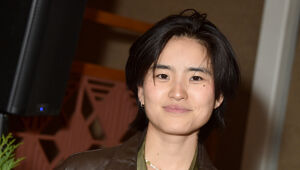
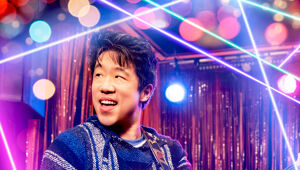
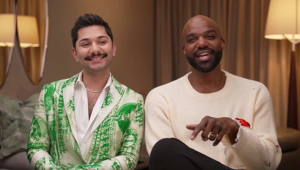
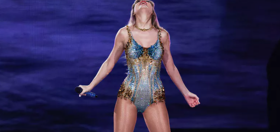

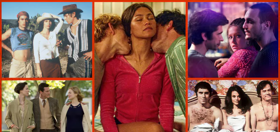
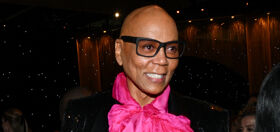
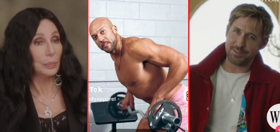
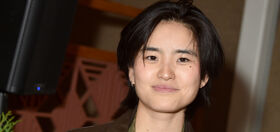


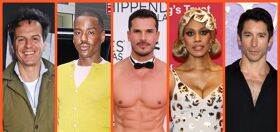
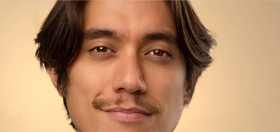

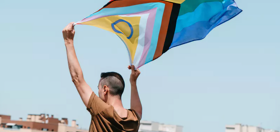
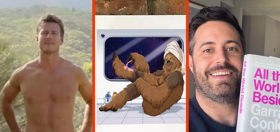
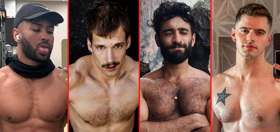
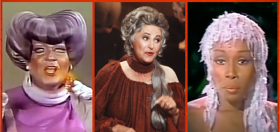
Kangol
This was one of the best and most informative interviews I’ve read on Queerty in a while. Thanks for posting it.
Thad
Agreed. Yes, it’s promotional, but for a project worth seeing. I might not have heard of it otherwise.
designdude
This is one of the best articles Queerty has posted. Amazing that a good subject, topical and noteworthy did not have to have a dick slip to get space here. The Queerty staff should take note.
Birdbrain1963
Would someone block JoRock23 from this website, please!
Scott Gatz
Done